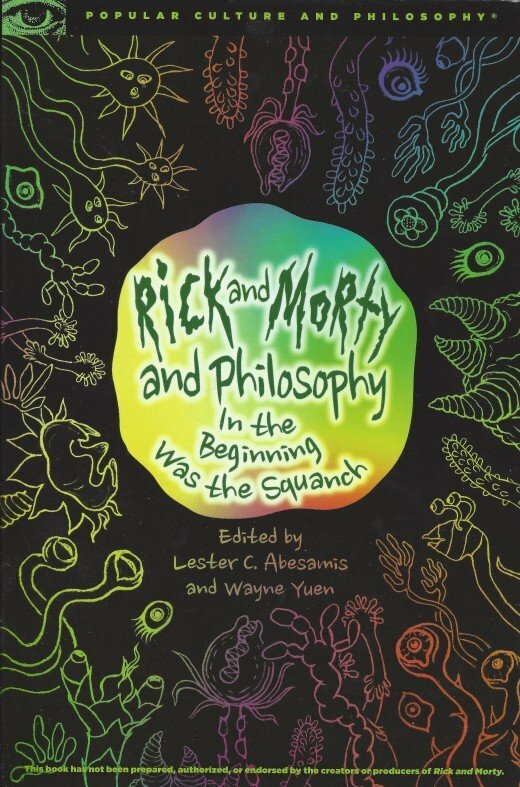Rick and Morty and Philosophy is an installment in the deep “and Philosophy” series of books. What can you get out of this book mining an Adult Swim cartoon for wisdom?
Disclaimer: I received a free copy of the book Rick and Morty and Philosophy in exchange for an honest review.
What Is Rick and Morty?
Rick and Morty is a popular cartoon series on Adult Swim. At the most basic level, it features an alienated genius grandfather traveling around the universe and alternate realities with his average grandson. The family dynamics are complicated. There is a stupid, literal son in law that the grandpa resents for knocking up his daughter. She produced a rather average granddaughter and grandson. There’s a constant tug of war for the genius’ daughter; she’s torn between her father and the father of her children.
Add in time travel, timeline rewrites and weird tech, and you have the opportunity to demonstrate many theoretical paradoxes and challenge philosophical concepts. That’s the mother load the book Rick and Morty and Philosophy mines for wisdom and uses for examples of philosophical concepts and case-studies.
The Strengths of the book Rick and Morty and Philosophy
The very premise of the television show Rick and Morty provides opportunities to present various complex questions on the meaning of life, the purpose of life (if any), the impact of nihilism, what makes us who we are, and many more philosophical questions.
For example, in one classic scene of the TV show, the sister Summer had a fight with her mother and wants to run away from life, a very real possibility given a grandfather who travels to alternate dimensions and has buried alternate versions of himself. Her brother Morty says, “Nobody exists on purpose. Nobody belongs anywhere. Everybody is going to die. Come watch TV.” Knowing that you have no purpose or deeper meaning can be painful, but you can choose to ignore that fact and enjoy life. Or you can create meaning through relationships and results. Whole books are written to explain this concept, and here it is stilled to a few sentences of dialogue.
What is identity when you can visit other versions of yourself and your loved ones via a portal gun? How much of your identity is of your own choosing, and how much of it is determined by society and our relationships? What makes you psychologically you? Is it sharing certain experiences? Is the person whose timeline radically varied from yours at an early age really “you”? When your consciousness and emotional states are cloned into a new, very different body, who is it? When the Brainalzyer is copying Rick’s mind into various versions of himself and other creatures, you’re forced to ask, “Is that really Rick, version of him or something else?” In another chapter, you’re asked if an evil you is you, and what is ethical if the rules of another universe are different.
Identity is explored in several essays. For example, if a version of you from another universe kills you, is it murder, suicide or something else? In others, the nature of truth is explored. When there are infinite alternate realities, everything is possible, including the possibility truth isn’t universal.
A clear upside of this book is that you can use the rather well-known scenes from the TV show to discuss philosophy with people instead of trying to explain the conundrum of the ship replaced piece by piece to lead into a discussion on “what makes you, you”.
The Downsides of Rick and Morty and Philosophy
You need to be quite familiar with the show to understand the references. The TV show this book digs through to present philosophical lessons is PG-13 for language, sexual innuendo and violence. Some of this carries over to the book, though I’d rate that a strong PG.
Chapter 3 ends up arguing there is a good chance we’re in a simulation, whether created by future descendants of ourselves or aliens. Chapter 4 gets on track with discussing whether God(s) could exist but not be benevolent or disinterestedly distant.
The Opinion of Our Family’s Rick and Morty Expert
I was only somewhat familiar with Rick and Morty before getting this book, so I handed it to our family’s Rick and Morty expert – my middle school son. To my surprise, he read several chapters of the book. He thought that some of the topics overlapped, but each author took these subjects in different directions, so it wasn’t repetitive. He also noted that the jokes in the book are completely in line with the TV show. He laughed at a number of points.
He considered the book Rick and Morty and Philosophy an interesting explanation of concepts he’d already seen shown in the TV show. It taught him a number of high-level terms and the logical structures that were alluded to in the show.
Summary
I give Rick and Morty and Philosophy four stars. If you need an educational or enlightening book for a Rick and Morty fan, then it is a must-have for their bookshelf.
***
Cross-posted from Owlcation



Comments
Leave a Reply